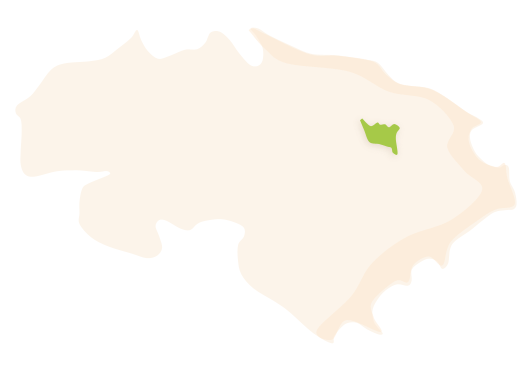Jesús Pobre, constituted as an EATIM (a territorial local entity smaller than a municipality), is a small town located at the foot of the south face of El Montgó, at the westernmost end of the Gorgos plain and guarded by the hillock of Els Molins. It has fertile land and an extension of 7.04 km², and is located at an altitude of 115 metres. The town currently has a total of 704 inhabitants, called Jesuspobrers and Jesuspobreres.
 Municipal district of Jesús Pobre. Extension 7.04 km². Inhabitants 704 (data INE 2021).
Municipal district of Jesús Pobre. Extension 7.04 km². Inhabitants 704 (data INE 2021).HISTORY
The earliest settlements found near the town are located on the mountain called El Montgó, at the Iberian settlement of Alt de Benimaquia, dating from the 6th century BC. It is one of the oldest places known for the production of wine in the entire Valencian territory, which at that time traded with Phoenicians and Greeks. At Coll de Pous, very close to Jesús Pobre, there is another Iberian site from the 6th century BC that had been destroyed by the construction of terraced fields, in which a quantity of precious coins called the Montgó treasure was found.
From Roman times, there is a pottery workshop in the area of Bisserots, which dates back to the 2nd century AD. There, different kinds of amphorae were produced to store wine and oil.
To find the origin of the current town centre, one needs to travel back to the Andalusian period, to the original farmstead of Benissadeví, in the late 10th century or the beginning of the 11th.
In the 17th century, the population of the area of Jesús Pobre was consolidated with the already Christian farmsteads of Colomer, Ferrando, Bisserots and Benitzaines. But what became the final location of the town was established by the foundation, during the second half of the 17th century, of the hermitage of Jesús Pobre by the Franciscan friar Pere Esteve. On the 28th of April 1658, the hermitage of Jesús Pobre was established, to which little by little parts were added until it became a Franciscan convent hospice. The growing devotion caused the settlement’s name to be changed definitively at the end of the 17th century, although with some curious twists, namely that in April 1936 and with the Civil War in full swing, some Valencian towns and villages changed their religious names to other more secular ones. This was precisely what happened with Jesús Pobre, renamed Mongòlia during the three years of the Civil War, in reference to Montgó.
Jesús Pobre is a village marked by an agricultural tradition based mainly on two crops: grapes and wheat. In this area, one can visit “riuraus” where grapes are still dried to produce raisins. This particular element and the scalding of the grapes make this small settlement stand out due to its many activities. The village sponsored the report that eventually allowed the process of scalding to be declared an “intangible good of cultural interest” (BIC) of the Valencian People, a concession that was obtained with the support of multiple entities. The title was granted by the Ministry of Culture of the Generalitat Valenciana in 2018. As for wheat, deeply rooted in the town as shown by the presence of the three windmills, the cultivation and transformation of a native grain has been recovered by way of a local project called “Blat de la Marina” (wheat from La Marina).
The market of El Riurau is one of the most typical activities in the area which brings together people who love the products of the land.
FESTIVITIES
- L’Escaldà is a celebration that takes place on the last Sunday of August, during which the process of transforming grapes into raisins is re-enacted.
- Festivities in honour of the patron saint are celebrated 50 days after Easter.
- The summer festivities are celebrated around L’Escaldà and are organised by the neighbourhood associations of Jesús Pobre.
- The Cabrerot festivities are held around the 9th of October. “Cabrerot” is the name given to the last bunch of grapes that grows out of the vine.
- Market of El Riurau, open every Sunday: during summer, from the 30th of June onwards, it is open in the evenings, from 6pm to 11pm; during the rest of the year, beginning on the 20th of September, it is open in the mornings, from 9am to 2pm.
- The second-hand fair called “Fira Brocanters” is a market of antiques, vintage, retro, industrial, collectables, etc. It takes place every first Sunday of each month from nine in the morning to two in the afternoon.
GASTRONOMY
- ”Porra” is a dish made with “melva” (a type of fish), potatoes, Swiss chard and dried tomato.
- Fried buns with herbs.
- Rice with onions.
- Flatbreads (“coques”) with raisins.